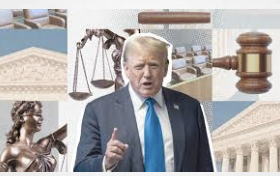https://legaltechnology.com/2024/11/08/navigating-the-legal-tech-landscape-under-a-trump-administration-growth-meets-uncertainty/Following the election this week of Donald Trump as president of the United States, it’s putting it mildly to say that the legal tech sector anticipates a mixed bag of opportunities and challenges ahead. Political leanings aside, Trump’s policies are widely expected to encourage growth and investment, and the US markets have responded favourably. However, his administration is also highly likely to bring volatility, particularly in the regulatory, trade, and immigration arenas.
Thought leaders in the legal technology and operations space have given us their early thoughts on how these dynamics could play out, and hopes for how they won’t.
Deregulation and Growth: Opportunities and Ethical Dilemmas
Trump’s administration is expected to adopt a lighter regulatory approach towards AI and other emerging technologies, potentially fostering innovation by reducing compliance burdens. Trump’s tax policies, particularly the extension of 2017’s corporate tax cuts, are also likely to provide tech companies with a windfall that could translate into increased profitability and strategic investments.
On the plus side, a less interventionist approach from Trump’s administration could stimulate overall business growth. Jenifer Swallow, former director of Lawtech UK, and a strategic adviser and former general counsel, told Legal IT Insider that it was too early to know anything for sure but said: “He will be all in on growth, so we’ll see more business deals overall and a less interventionist regulatory strategy. There’s a reason why Silicon Valley mostly supported him. They want to be left alone to get on with business, which they will now do, with a range of ramifications.”
Less regulatory constraints and oversight of AI may mean that tech giants may find new freedom to innovate. Mike Haven, head of global legal operations at Intel told us: “I suspect we will see a favorable regulatory climate, at least for some categories, such as crypto, autonomous vehicles, and AI, and the FTC [Federal Trade Commission] may start to back off antitrust claims against tech companies.” He adds: “Less regulatory and tax pressure may allow more space to invest in R&D and accelerate innovation. It’s going to be interesting.”
Despite losses in the likes of the Microsoft-Activision merger and other cases, the FTC and Department of Justice have maintained an aggressive stance that has likely deterred mergers, and it is possible that a more permissive atmosphere ahead will foster more consolidation. Prashant Dubey, chief strategy officer of Agiloft, says: “There may some challenges with M&A due to the protectionist policies of a Trump administration, but in my view, these will be more than made up for by the decrease in antitrust enforcement, as well as the projected dismantling of current antitrust actions taken by the Biden administration.”
Dubey, who recently published a book, GenO: The Rise of Legal Operations with Haven, said: “Tech, and especially big tech will benefit significantly from the tax policies of a Trump administration – one that promises to lower the tax on corporations.”
On the flip side, there are significant concerns around what a lack of regulation means for the responsible development of technology, particularly Generative AI.
Dubey says that while less regulation may spur investment, equally it may lead to irresponsible technology products and features being introduced that don’t fully consider the impact on users and consumers. He observes: “Without more external checks and balances, it is my view that we will see more ‘mistakes’ made that will negatively impact consumers.”
There are also global ramifications when it comes to AI ethics, and industry advisor Justin North, a director of UK consultancy Pickering Pearce says: “The light touch approach to regulation and centralisation of government functions means that AI companies can develop solutions without the same level of concern or rigour for data privacy and ethical use of AI – this may end up causing issues in the UK, Europe and APAC given it is in direct contrast to our approach to data privacy. Incompatibility amongst regulators across the world may be a problem for all.”
There is a sense of foreboding that this is exactly where the Trump regime will end up, but referring to Trump’s close relationship with tech billionaire Elon Musk, Swallow says: “AI is part of the growth agenda but Musk has been vocal about the risks and will be influential in the Trump administration.”
It is worth noting that if there is a battle of regulation, it will benefit legal advisers, but also the likes of legal tech compliance vendors. Richard Mabey, founder of contract management vendor Juro said: “One concern is how AI regulation will diverge between the UK, Europe and the US. While Trump’s overall approach may be one of deregulation, a US-specific regulatory regime that conflicts heavily with the EU AI Act and other applicable regulation may actually increase compliance work for AI-native software like Juro.”
On that note, Trump’s inclination toward tariffs, particularly on Chinese goods, could also disrupt global supply chains, raising costs for tech companies that rely on international components. Dubey notes that both lawyers and legal tech repapering solutions will be required as companies adjust supply chains, commenting: “If tariffs are imposed on Chinese imports (and all imports to a lesser degree), the global supply chain disruptions will drive the need to remediate and repaper contracts all through the supply chain. This will necessitate that technology identify which agreements are subject to remediation and also be able to track data in contracts that will be critical for forecasting and cash management.”
Immigration and Talent Acquisition
Changes in immigration policies and the mass deportation threatened are likely to tighten the tech talent pool, a move that may hinder tech – and legal tech’s – growth potential. There are also fears that those in emerging fields like AI and data science, could leave the U.S. due to an uncertain political environment, reducing the diversity that is so badly needed to ensure that AI is ethical and unbiased.
Read the full article at
Navigating the legal tech landscape under a Trump administration: Growth meets uncertainty





